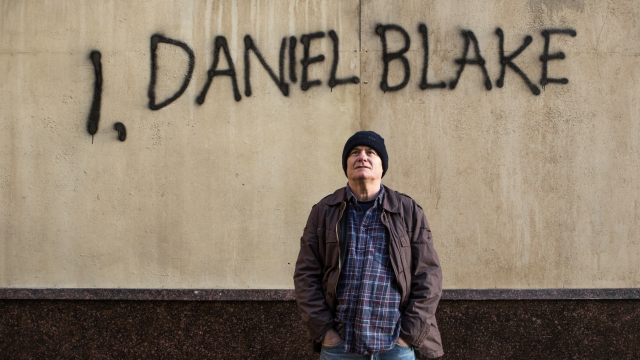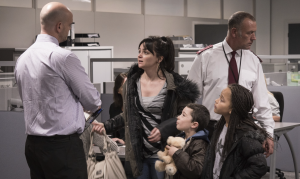
The Utopia in I, Daniel Blake
Entertainment is often a matter of utopia. In other words, popular culture often works by offering its viewers (or readers) a sense of what a massively better world would be like.
I, Daniel Blake is a depressing movie. If you go to see it, it’s hard not to leave the theater feeling angry and sad. But, fortunately, that’s not the extent of its impact. The 2016 film by Ken Loach follows Daniel Blake, a 59-year-old widowed Newcastle man who is rendered unfit for work by a heart attack, and ends up spiraling into poverty amidst a mess of bureaucracy, sanctions, and appeals. While the film is undeniably angry about the state of England, built into that anger is hope that we can do better. Not only is this implied by how bad it shows things to be, but the film constantly gives us the tools to imagine what a better society would be like. We will come to see, then, that in fact this deeply distressing and grim movie is in large part a matter of utopia.
The primary emotions that I, Daniel Blake leaves with its viewers, anger and sadness, are indirectly those which are most clearly in service of utopian impulses. All polemics—many documentaries, for example—work by making people angry at how things are with the goal of getting them to imagine a better world, and maybe even do something about it. A movie like Food Inc. makes people angry at how fast food is produced. Naturally, people start imagining more humane and just ways of producing food. I, Daniel Blake, while a fictional story[1], is no different—it incites anger at how the government and society treat the poor. In the movie, Daniel becomes friends with a young single mother of two in a job center. There is a heart-wrenching scene midway through the film in which the woman, Katie, breaks open and starts to eat a can of raw food in a food pantry in a moment of desperate hunger. The viewer can’t help but be outraged that our society allows good, hardworking people to go hungry like that. The implicati on of this feeling is that things could and must be better. Through our outrage at hunger, we start to imagine a world in which people are not hungry—where no mothers have to go without dinner to feed their children. This vision is one of the central tenets of the classic utopia.
on of this feeling is that things could and must be better. Through our outrage at hunger, we start to imagine a world in which people are not hungry—where no mothers have to go without dinner to feed their children. This vision is one of the central tenets of the classic utopia.
Yet, the scene in the food pantry is far from the only one inciting anger at the status quo. Daniel is constantly in the job center, trying to make his way through the maddening bureaucracy to get his benefits. His physician tells him he should absolutely not be working, and yet the medical examiner at the job center, after a frustratingly impersonal exam (which never asks about his heart—the thing making him unfit), deems him fit for work. Waiting to appeal the verdict would mean weeks without pay, so he is ironically forced to apply for job-seeker status, which, after days of figuring out how to fill out the form online, has him walking around handing resumes to employers he can’t work for. After all that, he is unable to prove that he was indeed actively looking for a job (he neglected to take photos of potential employers with his very un-smart phone), so he is written up for a sanction. By the end Daniel is selling furniture to stay above water. The whole Sisyphean process is positively infuriating, and the tolls it takes on Daniel are deeply depressing. Every time he deals with the bureaucrats running his life he is met with a total lack of respect and compassion. Depicting this reality is meant to incite anger in viewers, inviting them to imagine a society that is better, in which good working class people are not so thoroughly oppressed by the system. Thus, the anger that inspires and runs through the film has plainly utopian impulses.
However, one might say that these impulses are merely expressed in a derivative sense—the film depicts a harsh reality and any ideas of utopia fall on the viewers’ imagination. But a second look at the movie reveals that in fact, it continually shows us what kind of principles and behavior utopia would be based on. All of the scenes of misery and hardship caused by the system are contrasted with scenes in which compassion and love for one’s neighbor are shown as forces of good and happiness. Right from the start of the movie, Daniel interacts with people who show him kindness—his coworker, who tells him, in stark contrast to the people at the job center, “Give us a shout if you need anything, I mean that.” A few minutes later, Daniel shows kindness of his own by standing up for a stranger (Katie) when the job center sanctions her for being late, and doesn’t listen to what she has to say. This sense of justice and compassion that he has, even for someone he doesn’t know, turns out to result in a lasting, meaningful relationship. Thus, the movie presents to us a world where doing the right thing doesn’t just have to be done for its own sake—it can have immediate (and lasting), heartwarming benefits. Soon, Dan starts to spend more time with Katie and her family, fixing things around her apartment and entertaining the children. This visibly brings joy to him, a lonely widower, and the kids, who have just moved away to a new town and a shoddy apartment, and are in need of some cheering up. The movie shows us that spending time with neighbors can have tangible benefits (he shows them tricks to warm up their house, fixes their toilet), and conversely offering tangible help to neighbors can result in quality time and joy.
The film unremittingly shows compassion to be the solution to the indifferent abuse of the system. When Katie is caught trying to shoplift some healthcare essentials, the manager decides to pay for them himself and let her go. Most of the time in reality that wouldn’t happen, but the movie is determined to show us a world where neighbors and even strangers show kindness to one another, especially when they are in need. When Daniel has trouble figuring out how to work a public computer to fill out the job seeker application, a few different young people help him out. Again, we are invited to see that the kindness of strangers can help solve our problems—especially problems laid on us by the system or bureaucracy, because that’s the issue we’re angry about. With close viewing, the connection starts to become clear: a culture of compassion is presented as the utopian alternative to the oppressive State. Towardsthe end, the film even gives us clarification on how this utopia built on compassion functions. When Katie’s daughter Daisy goes to check on Daniel in a time of need, she asks, “Did you help us?” “Suppose so,” he responds. “So why can’t I help you?” We see here that kindness is met with kindness—that’s how it works. In moments like these, you can hear the filmmaker’s pleads that this be how everything works—these compassionate attitudes are always rewarded with positive results, as opposed to the grim ones suffered at the hands of the merciless State.
In addition to showing us the principles with which utopia should be based on, I, Daniel Blake demonstrates how we might go about reaching it: defiance. This starts at the very beginning of the movie: in the first scene, we hear Daniel being interviewed by the medical examiner, who asks him all sorts of questions about his physical abilities, but not about his heart, the actual thing keeping him from working. It’s a darkly humorous bit of dialogue, in which Daniel repeatedly cracks jokes and points out her rational flaws. It’s an introduction to the frustrating bureaucracy that is the focus of the movie, shown to a degree that we’ve all experienced, nothing too drastic yet. And yet, on a small scale, this scene presents to us the main conflict of the movie: it depicts today’s bleak reality, contrasted by a utopian vision (fueled in this scene by humor and reason). In the real world, most people just go along with these mundane elements of our existence, putting up with bureaucracies. Not Daniel—in this utopian glimpse, the kind we consistently get from entertainment, people stand up to even the docile forms of the State’s oppression.
Daniel’s defiance proves to be a constant theme throughout the movie. When his neighbor China tells him, “Dan, they’ll fuck you around…I know dozens who have just given up,” Daniel responds angrily, “Well they’ve picked the wrong one if they think I’m gonna give up.” We’re invited to imagine that an individual’s defiance can challenge the constant subjugation of the system. Most people would accept their fate in resigned solitude, but not Daniel. Towards the end of the film,
 he expresses his anger for the world to see. He commits a small revolutionary act in spray-painting the wall of the job center—people around him are inspired and cheer. It’s one of the film’s most satisfying and positive moments, the message of which can be interpreted as such: not only should a better world be focused on compassion, but also self-respect and defiance might be the first steps to getting there.
he expresses his anger for the world to see. He commits a small revolutionary act in spray-painting the wall of the job center—people around him are inspired and cheer. It’s one of the film’s most satisfying and positive moments, the message of which can be interpreted as such: not only should a better world be focused on compassion, but also self-respect and defiance might be the first steps to getting there.
If you still remain unconvinced that the movie lays out a utopian vision for us, we can look to the character of Dylan, Katie’s son. Interestingly enough, Dylan turns out to be a child-sized package of the whole concept. For a while, he is very
quiet; in one scene, he is continually bouncing a ball, and he ignores Daniel’s attempts at conversation. When Daniel asks his sister Daisy about it, she says “people never listen to him, so why should he listen to them?” This directly relates Dylan’s struggles to those of Daniel, Katie, and everyone else subjugated by the system—the bureaucrats don’t listen to what people have to say. Most children accept their subjugation to adults, but as this movie gives us flashes of utopia all over the place, Dylan is defiant—he doesn’t listen back. This of course ties into Daniel’s continual defiance to the bureaucracy. But here’s the kicker: the more Daniel hangs around Dylan and treats him with compassion, the more he opens up. Daniel treats him with respect and dignity by asking him a counterintuitive question, “which kill more people, coconuts or sharks?” This may seem like a small act, but when he treats him with the respect many people fail to give to children, Dylan eventually opens up and engages in conversation, reciprocating respect. This whole storyline, then, can be seen as allegorical, truly expressing the main idea of the movie: people in positions of authority should use compassion and respect just as equals often do with each other. Daniel doing so towards Dylan is a clear example of this utopian vision at work.
There has been a huge debate about the political implications of I, Daniel Blake. David Cox writes in The Guardian that supporters of the Daniel Blake cause should be careful what they wish for; he believes the requirements of a public welfare system are what they are, and the only alternative is to rely on the charity of family, friends, and local volunteers to feed and clothe the poor like we used to. But Cox misunderstands the utopian vision the movie presents—he doesn’t think big enough. While there are certainly some changes and policies that we can adopt now to improve the functioning of the welfare system, the movie asks us to imagine a society where compassion and respect are universally accepted values. In this utopian vision, we could still have the efficiency and non-discrimination of a government welfare system, but without the standard of callousness—a system with a baseline of respect, dignity and compassion afforded to everyone. This may be a long way off, but that’s why it’s a movie.
I, Daniel Blake may seem on the surface to be simply a depressing story, or just an expression of anger at how things are. But when you look closely, it turns out to be much more: most importantly, a view of how things should be—a utopia. This is cemented in the final lines of the movie. Even after his passing, Katie carries on Daniel’s message, reading his words at his funeral: “My name is Daniel Blake. I am a man, not a dog. As such, I demand my rights. I demand you treat me with respect. I, Daniel Blake, am a citizen; nothing more, nothing less.” While Daniel’s final message sticks up for his own dignity, her reading it shows that the connection formed out of compassion had a lasting impact—that in the end the utopian vision is about one another.
[1] The difference between documentary and fiction here is actually an issue of importance surrounding the movie, with some, including the actual manager of the Newcastle job center depicted, claiming the film misrepresents reality. For an in-depth discussion of the two mediums, see “Representing Reality: Issues and Concepts in Documentary” by Bill Nichols
Citations:
Bill Nichols, Representing Reality: Issues and Concepts in Documentary, Indiana University Press, 1991
David Cox, “Why British Baftas frontrunner I, Daniel Blake may betray its own cause,” The Guardian, 1/10/17
Richard Dyer, Only Entertainment, “Entertainment and Utopia,” London: Routledge, 2002
This essay was read by Austin Barr.